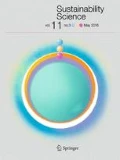Abstract
The proceedings of the National Science Foundation supported WIS2DOM workshop state that sustainability scientists must respect the “protocols” of practitioners of Indigenous sciences if the practitioners of the two knowledge systems are to learn from each other. Indigenous persons at the workshop described protocols as referring to attitudes about how to approach the world that are inseparable from how people approach scientific inquiry; they used the terms caretaking and stewardship to characterize protocols in their Indigenous communities and nations. Yet sustainability scientists may be rather mystified by the idea of protocols as a necessary dimension of scientific inquiry. Moreover, the terms stewardship and caretaking are seldom used in sustainability science. In this case report, the authors seek to elaborate on some possible meanings of protocols for sustainability scientists who may be unaccustomed to talking about stewardship and caretaking in relation to scientific inquiry. To do so, the authors describe cases of Indigenous protocols in action in relation to scientific inquiry in two Indigenous-led sustainability initiatives in the Great Lakes/Midwest North American region. We claim that each case expresses concepts of stewardship and caretaking to describe protocols in which humans approach the world with the attitude of respectful partners in genealogical relationships of interconnected humans, non-human beings, entities and collectives who have reciprocal responsibilities to one another. We conclude with a discussion of the implications of Indigenous protocols for future dialog between practitioners of sustainability and Indigenous sciences.
Similar content being viewed by others
References
Berkes F (2008) Sacred ecology: traditional ecological knowledge and resource management. Taylor & Francis, Philadelphia
Cajete GA (2014) Re-building sustainable indigenous communities: applying native science. In: Johnson JT, Louis RP Kliskey A (eds) Weaving indigenous and sustainability sciences: diversifying our methods. National Science Foundation, Arlington, pp 36–39
Clark WC (2007) Sustainability science: a room of its own. Proc Natl Acad Sci 104(6):1737–1738
Climate and Traditional Knowledges Workgroup [CTKW] (2014) Guidelines for considering traditional knowledges in climate change initiatives. https://climatetkw.wordpress.com/guidelines/. Accessed 25 March 2015
Deloria V, Wildcat DR (2001) Power and place: Indian education in America. Fulcrum Publishing, Golden
Forsyth T (1911–12) Manners and customs of the Sauk and Fox Nations of Indians. In: Blair EH (ed) The Indian tribes of the Upper Mississippi Valley and region of the Great Lakes, vol 2.AH Clark Co, Cleveland, pp 183–245, online facsimile at http://www.wisconsinhistory.org/turningpoints/search.asp?id=1606
Holtgren M (2013) Bringing Us Back to the River. In: Auer N, Dempsey D (eds) The Great Lake Sturgeon. Michigan State University Press, East Lansing, pp 133–147
Holtgren M, Ogren S, Whyte KP (2014) Renewing relatives: Nmé Stewardship in a shared watershed. Tales of hope and caution in environmental justice. http://hfe.wfu.edu/blog/2014/renewing-relatives-nme-stewardship-in-a-shared-watershed/. Accessed 25 March 2015
Jerneck A, Olsson L, Ness B, Anderberg S, Baier M, Clark E, Hickler T, Hornborg A, Kronsell A, Lövbrand E, Persson J (2011) Structuring sustainability science. Sustain Sci 6:69–82
Johnson JT (2013) Kaitiakitanga: telling the stories of Māori self-determination in resource management. In: Johnson JT, Larsen SC (eds) A deeper sense of place: stories and journeys of Indigenous-academic collaboration. Oregon State University Press, Corvalis, pp 127–138
Johnson JT, Louis RP, Kliskey A (2014) Weaving indigenous and sustainability sciences: diversifying our methods. National Science Foundation, Arlington, pp 1–116
Keali‘ikanaka‘oleohaililani K (2014) Hawaii Environmental Kinship. In: Johnson JT, Louis RP Kliskey A (eds). Weaving indigenous and sustainability sciences: diversifying our methods, National Science Foundation, Arlington, pp 77–78
Kimmerer R (2013) Returning the gift. What does Earth ask of us? Center for humans and nature. http://www.humansandnature.org/returning-the-gift-response-80.php
Komiyama H, Takeuchi K (2006) Sustainability science: building a new discipline. Sustain Sci 1:1–6
Little Bear L (2000) Jagged worldviews colliding. In: Battiste M (ed) Reclaiming indigenous voice and vision. University of British Columbia Press, Vancouver, pp 77–85
McGregor D (2009) Honouring Our Relations: An Anishnaabe Perspective on Environmental Justice. In: Agyeman J, Cole P, Haluza-Delay R (eds) Speaking for ourselves: environmental justice in Canada. University of British Columbia Press, Vancouver, pp 27–41
McGregor D (2014) Theoretical considerations for indigenous scientific traditions. In: Johnson JT, Louis RP, Kliskey A (eds). Weaving indigenous and sustainability sciences: diversifying our methods. National Science Foundation, Arlington, pp 81–84
Mitchell J (2013) N’me. In: Auer N, Dempsey D (eds) The Great Lake Sturgeon. Michigan State University Press, East Lansing, pp 21–26
Mohawk J, Barreiro J (2010) Thinking in Indian: a John Mohawk reader. Fulcrum Publishing, Golden
Momaday NS (1976) Native American attitudes to the environment. In: Capps WH (ed) Seeing with a native eye: essays on native American religion. Harper and Row, New York, pp 79–85
Rundstrom R, Deur D (1999) Reciprocal appropriation: toward and ethics of cross-cultural research. In: Proctor JD, Smith DM (eds) Geography and ethics: journeys in a moral terrain. Routledge, London New York, pp 237–250
Sakakibara C (2010) Kiavallakkikput Agviq (Into the Whaling Cycle): Cetaceousness and climate change among the Iñupiat of arctic Alaska. Ann Assoc Am Geogr 100(4):1003–1012
Wark K (2014) WIS2DOM–Weaving indigenous and sustainability sciences:diversifying our methods workshop. In: Johnson JT, Louis RP, Kliskey A (eds) Weaving indigenous and sustainability sciences: diversifying our methods. National Science Foundation, Arlington, pp 101–103
Whyte KP (2013) On the role of traditional ecological knowledge as a collaborative concept: a philosophical study. Ecological Processes 2:1–12
Wildcat DR (2013) Introduction: climate change and indigenous peoples of the USA. Clim Change 120:509–515
Williams T, Hardison P (2013) Culture, law, risk and governance: contexts of traditional knowledge in climate change adaptation. Clim Change 120:531–544
Author information
Authors and Affiliations
Corresponding author
Additional information
Handled by Andrew Kliskey, University of Idaho, USA.
Rights and permissions
About this article
Cite this article
Whyte, K.P., Brewer, J.P. & Johnson, J.T. Weaving Indigenous science, protocols and sustainability science. Sustain Sci 11, 25–32 (2016). https://doi.org/10.1007/s11625-015-0296-6
Received:
Accepted:
Published:
Issue Date:
DOI: https://doi.org/10.1007/s11625-015-0296-6




